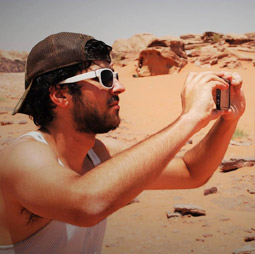My Transition from Teaching English in the Middle East to Journalism
Written By: Adam Lucente | Updated: June 29, 2023
Written By: Adam Lucente
Updated: June 29, 2023

Simon and I got into the shared taxi from the Tunisian capital Tunis to Sidi Bouzid in the south early in the morning. The taxi, which was a nine or so seat van, didn’t run on a schedule. When it was full, it went. Then the next one went when it, too, was full. Simon was a freelance journalist in Tunisia, but he also taught English to help make ends meet. It’s common for journalists in the Middle East to have a second job. Some are teachers; others copy writers, translators etc. I knew Simon because we taught together at an American non-profit in Tunis in 2014. I learned Arabic in college, and he brought me to Sidi Bouzid to interpret for him for an article he was writing on the legacy of the Tunisian revolution.
The Tunisian revolution began on December 18, 2010, when Mohamed Bouazizi set himself on fire on the main street in impoverished Sidi Bouzid. He had had a dispute with a local policewoman over the permit for his fruit-selling business. This sparked demonstrations against the government of long-time president Ben Ali, which culminated in his resignation on January 14, 2011. Anti-government protests began in Egypt the next day, and soon people in Syria, Libya, Bahrain and Yemen took to the streets. This began the Arab spring. It’s what preceded the harrowing civil wars in Syria and Yemen today.

I didn’t have any grammar points to teach the day we went to Sidi Bouzid. Instead, I was the student. I learned about the situation in the city from the street vendors who once called Bouazizi a colleague as they answered Simon’s questions.
On the way back to Tunis, I decided to become a journalist. I’m currently working as both a journalist and English teacher in the Kurdistan Region of Iraq because of that trip.
I kept interpreting for Simon in Tunis, and wrote a few articles for a free website there. I then moved back home for a short time, and freelanced for one of the local papers in my hometown outside of New York City. Next, I took a job teaching English in Amman, Jordan, and also did freelance reporting on the Jordan-Israel gas deal, Sudanese refugees in Amman, and the Syrian civil war from there. After that was Lebanon, where I continued freelancing on Syria, and I also started making trips to Iraq to cover the fight against ISIS at that time.

After the Kurdish military’s fight against ISIS in Mosul, Iraq, ended, I moved back to the U.S. and worked for two different local papers. I ultimately want to settle back home. However, like many people who work abroad, I grew bored and restless in the U.S. The community board meetings I was covering didn’t interest me like human rights and conflict in the Middle East, so I came back to Erbil, Kurdistan Region, Iraq, where I am now.
It’s a lot of work teaching and reporting at the same time, but I’m happy. Thinking about what you want to do can only get you so far. I did this throughout college, and failed to discover a career path I liked. It was only when I went out into the world and taught, and learned, that I found what I want to do in life.
Posted In: Teach English in Tunisia, Teach English in Middle East, Teach English in Jordan, Life After Teaching English Abroad, Teach English in Iraq
Adam Lucente
Adam Lucente is a journalist and English-language teacher from New York City. He learned Arabic in college and has since taught in Tunisia, Jordan, and the Kurdistan Region of Iraq. As an ITA Alumni Ambassador, Adam has shared many of his experiences and insights with others interested in teaching in the Middle East through numerous articles.
Want to Learn More About Teaching English Abroad & Online?
Request a free brochure or call 773-634-9900 to speak with an expert advisor about all aspects of TEFL certification and teaching English abroad or online, including the hiring process, salaries, visas, TEFL class options, job placement assistance and more.
"The Middle East is a very fascinating and unfortunately an extremely misunderstood area by so many. In a lot of ways, it’s an extremely easy place to adjust to, Western luxuries are quite accessible and almost everything is in English and Arabic."

- Katie Ayers
Teaches English in the UAE







